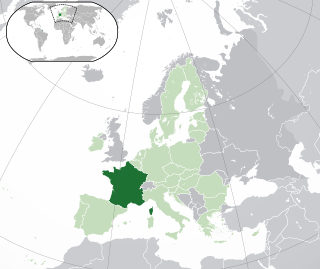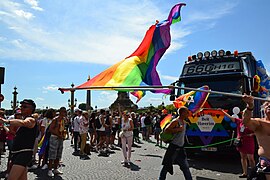
Shlomo Moshe Amar is the former Sephardic Chief Rabbi of Israel. He served in the position of Rishon LeZion from 2003 to 2013; his Ashkenazi counterpart during his tenure was Yona Metzger. In 2014 he became the Sephardic Chief Rabbi of Jerusalem.

Lesbian, gay, bisexual, and transgender (LGBT) rights in France are some of the most progressive by world standards. Although same-sex sexual activity was a capital crime that often resulted in the death penalty during the Ancien Régime, all sodomy laws were repealed in 1791 during the French Revolution. However, a lesser-known indecent exposure law that often targeted LGBT people was introduced in 1960, before being repealed in 1980.

Robert Assaraf was a Moroccan Jewish historian and writer. He resided between Paris, France and Marrakesh, Morocco.

The Union Libérale Israélite de France, commonly referred to as the rue Copernic synagogue, is a Reform Jewish congregation and synagogue, located in the XVIe arrondissement of Paris, France. Inaugurated on 1 December 1907, it is the oldest Reform synagogue in France.

Shmuel Trigano is a sociologist, philosopher, professor emeritus of sociology at Paris Nanterre University. He was Tikvah Fund Visiting Professor in Jewish Law and Thought at Benjamin N. Cardozo School of Law, New York (2009), and Templeton Fellow at the Herzl Institute (Jerusalem) program "Philosophy of the Tanakh, Midrash and Talmud" (2012-2013), (2015-2017). Elia Benamozegh European Chair of Sephardic Studies, Livorno, Italy (2002).
Lesbian, gay, bisexual, transgender (LGBT) affirming denominations in Judaism are Jewish religious groups that welcome LGBTQ members and do not consider homosexuality to be a sin. They include both entire Jewish denominations, as well as individual synagogues. Some are composed mainly of non-LGBT members and also have specific programs to welcome LGBT people, while others are composed mainly of LGBT members.

Daniel Guérin was a French libertarian-communist author, best known for his work Anarchism: From Theory to Practice, as well as his collection No Gods No Masters: An Anthology of Anarchism in which he collected writings on the idea and movement it inspired, from the first writings of Max Stirner in the mid-19th century through the first half of the 20th century. He is also known for his opposition to Nazism, fascism, capitalism, imperialism and colonialism, in addition to his support for the Confederación Nacional del Trabajo (CNT) during the Spanish Civil War. His revolutionary defense of free love and homosexuality influenced the development of queer anarchism.

Edmond Flegenheimer better known as Edmond Fleg, was a Jewish French writer, thinker, novelist, essayist and playwright of the 20th century. Fleg's oeuvre was crucial in constructing a modern French Jewish identity, rendering him an instrumental figure in the Jewish awakening during the interwar years. After World War I, Jewish writers began articulating a new, cultural definition of what it meant to be a Jew within the context of French Third Republic universalism. Through his writings — based on Jewish and Christian texts—Fleg formed the foundation of a modern French Jewish spirituality and self-understanding, which allowed secular French Jews to preserve their Jewish identity. In doing so, Fleg was calling for an exploration of the living texts of traditional Judaism as the basis for a modern Jewish identity, establishing a new literary direction devoted to re-interpreting biblical texts and legends, and liturgies.
Edith Bruder is a French ethnologist who has specialized in the study of African Judaism and religious diasporas, new religious movements, and marginal religious societies. She is a research associate at the School of Oriental and African Studies (SOAS), University of London; a research associate at the French National Center for Scientific Research (CNRS); and a research fellow at the Faculty of Theology's School of Biblical Studies and Ancient Languages, North-West University, South Africa.
Portuguese in France, also referred to as Luso-French, refers to people from Portugal who immigrated to or reside in France or French citizens of Portuguese descent. A common nickname among Portuguese people for their diaspora in France is aveques, from the French: avec, lit. 'with', though the term may be used in the reverse, that is, for Francophones living in Portugal, or for French people in general.

The history of the Jews in the Democratic Republic of the Congo can be traced back to 1907, when the first Jewish immigrants began to arrive in the country. The current Jewish Congolese population is mostly of Sephardi background.

Paris, the capital of France, has an active LGBTQ community. In the 1990s, 46% of the country's gay men lived in the city. As of 2004, Paris had 140 LGBT bars, clubs, hotels, restaurants, shops, and other commercial businesses. Florence Tamagne, author of "Paris: 'Resting on its Laurels'?", wrote that there is a "Gaité parisienne"; she added that Paris "competes with Berlin for the title of LGBT capital of Europe, and ranks only second behind New York for the title of LGBT capital of the world." It has France's only gayborhoods that are officially organized.

Ludovic-Mohamed Zahed is a French-Algerian imam. An openly gay Muslim, Zahed is the founder of an Islamic prayer room in Paris, France, with the goal of accommodating the LGBTQ and feminist Muslim communities. He also founded the LGBT Muslim association HM2F, and manages the Calem Institute in Marseille.
Constance de Castelbajac (1859–1886) was a French aristocrat and diarist. She served as the Marchioness of Castelbajac.

Le Juif et la France was an anti-Semitic propaganda exhibition that took place in Paris from 5 September 1941 to 15 January 1942 during the German occupation of France in the Second World War. A film version of the exhibition came out in French cinemas in October 1941.
This is a timeline of LGBT Jewish history, which consists of events at the intersection of Judaism and queer people.
Jewish-Muslim Friendship of France is an organization for interfaith dialogue between Jews and Muslims. Founded in 2004 by French Rabbi Michel Serfaty, it is known for its Jewish-Muslim Friendship Bus which travels across France to create meetings and connections with local partners, neighborhood associations, public authorities as well as local Jewish and Muslim communities. Its slogan is: "We look more alike than it seems."

The Law of 3 October 1940 on the status of Jews was a law enacted by Vichy France. It provided a legal definition of the expression Jewish race, which was used during the Nazi occupation for the implementation of Vichy's ideological policy of "National Revolution" comprising corporatist and antisemitic racial policies. It also listed the occupations forbidden to Jews meeting the definition. The law was signed by Marshall Philippe Pétain and the main members of his government.

A Good Jewish Boy is a 2024 French comedy-drama film written and directed by Noé Debré in his feature-length directorial debut. It stars Michael Zindel and Agnès Jaoui as the last two Jews living in their neighborhood. It was released to positive reviews.
















